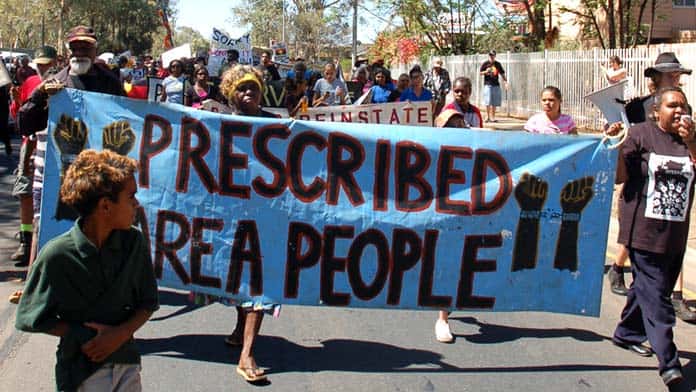This June marks 15 years since the Howard government began the NT Intervention, mobilising the army and introducing a wide swathe of racist, draconian controls over Aboriginal people and their lands.
Howard had long waged a war on self-determination and the gains of the Aboriginal rights movement made in the 1970s and 80s. The Intervention was the culmination of this, blaming Aboriginal culture for the social problems experienced in poverty-stricken communities and suspending the Racial Discrimination Act to re-establish Protection-era controls.
Shamefully, the Rudd Labor government, elected in late 2007, wholeheartedly embraced the Intervention, despite a growing protest movement and evidence of devastating impacts including spiralling rates of unemployment, malnutrition, youth suicide and incarceration.
The “income management” system, for example, which controls 50 per cent of the Centrelink payments of anyone living on Aboriginal land with a “BasicsCard”, was expanded by Labor to include all NT welfare recipients, and then a range of other Aboriginal and poor communities across Australia.
An end to the Intervention?
In 2012, the Labor government introduced “Stronger Futures in the Northern Territory” legislation, extending the Intervention’s blanket prohibition on alcohol and pornography on Aboriginal lands until 2022. These laws, which also give extraordinary powers to police to enter houses and vehicles without a warrant, are now set to expire in July.
This change, along with the election of a new Labor government which has shifted on some key questions, creates an opening to fight to finally end the NT Intervention and undo its destructive impact.
Labor have now promised to end compulsory forms of “income management”. But just before the election, Anthony Albanese said that he would be open to continuing Income Management if “requested by local communities”. There will be struggle ahead to ensure that no one is forced onto the scheme against their will.
Many other destructive imposed on NT Aboriginal communities since 2007 have drastically undermined the self-determination of communities and stripped them of resources needed to survive on their lands.
An initial aim of the Intervention, driven by both neo-liberal economics and racist assimilation policies, was to force Aboriginal people to leave remote communities deemed economically “unviable”.
The Community Development Employment Program (CDEP), which employed more than 7500 NT Aboriginal people in 2007, was abolished, leading to a collapse in local community services and an explosion in the unemployment rate.
While Labor have promised to scrap the exploitative “work for the dole” schemes forced onto communities since then, it will take a proper campaign to win a community-based, properly waged scheme that can allow communities to rebuild and thrive on their lands.
Re-establishing community control
Compulsory leases were imposed over Aboriginal-controlled township lands. All of the housing stock run by community-based Aboriginal organisations was compulsorily acquired and handed to the mainstream NT Housing authority to administer. Under Rudd, communities were forced to sign 40-year leases over housing lots, consolidating the control of NT Housing.
Limited investment in housing since then has hardly had an impact on shocking rates of overcrowding, with 20 or more people are often forced to share run-down dwellings, creating chronic health problems such as rheumatic heart disease. Billions of dollars of investment in new housing is required to end these conditions, along with an end to forced leases and the transfer of control of housing back to local people.
The Intervention reinforced NT government reforms that abolished scores of local Aboriginal community government councils in 2008, in favour of huge mega-shires. Intervention powers were used to transfer buildings and municipal assets to the new Shires, leading to a collapse in local authority, employment and services.
Changes to the permit system introduced through the NT Intervention also continue to deny Aboriginal people control over who can visit some parts of their communities. NT courts continue to be restricted from considering Aboriginal culture, custom and law when making bail and sentencing decisions, a racist restriction to the Crimes Act introduced with the Intervention that applies to no other cultural group in Australia.
Aboriginal health and legal services are now expressing real concerns that the lapse of “Stronger Futures”, and the sudden re-introduction of take-away alcohol into communities that have lived under strict prohibition since 2007, will lead to an increase in alcohol related harm.
The key struggle, however, must be to ensure resources and power are given to communities themselves to decide whether to allow the re-introduction of alcohol, and on what terms. Prior to the Intervention, more than 100 “dry areas” across the NT had been established by Aboriginal initiative, with local authorities often controlling the issue of permits to people who applied for exemption in their homes.
Ultimately, it is the despair, racism, unemployment and poverty inflicted on communities that drives harmful use of alcohol. All of these problems have become worse with the Intervention and will never be solved by racist criminalisation.
Defund the police
After the acquittal in March of NT Police Constable Zachary Rolfe over the death of 19-year-old Warlpiri man Kumanjayi Walker, community leaders from Yuendumu issued a statement of demands that put the shooting in the context of the NT Intervention.
Central to this is a call to reverse the huge increase in budgets for police, prisons and youth detention centres that have come since the Intervention. Indeed, in April this year, the NT Labor government announced “the biggest annual spend on police in the Territory’s history”.
Leaders from Yuendumu will lead a protest in Alice Springs on Saturday 18 June to mark 15 years of the Intervention, and demand “Justice for Walker” and all deaths in custody. They have called for people across Australia to join them and organise local protests, saying:
“We are calling for an end to all discriminatory powers and laws that were introduced with the NT Intervention and a restoration of our community control. Funding for punitive agencies empowered by the Intervention needs to be re-directed into our expert community services so that our solutions can be designed and implemented from the grassroots up”.
By Paddy Gibson






